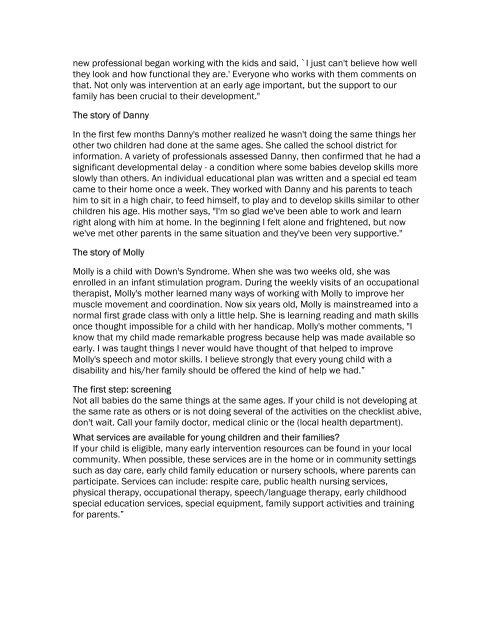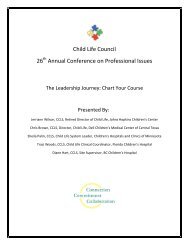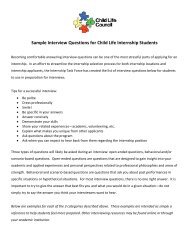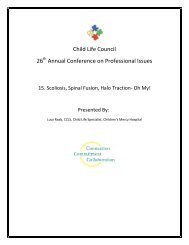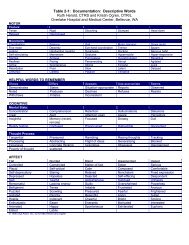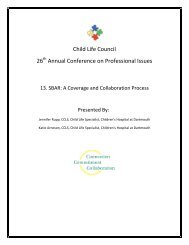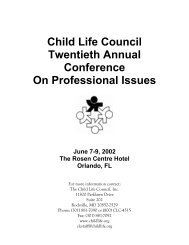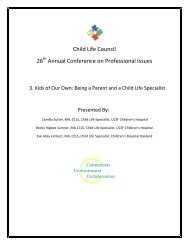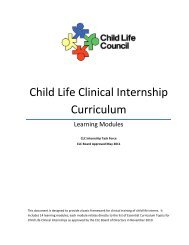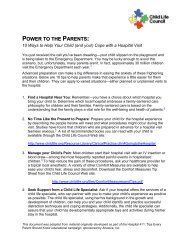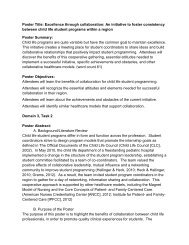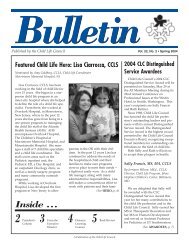Developmental Milestones Pamphlet - Child Life Council
Developmental Milestones Pamphlet - Child Life Council
Developmental Milestones Pamphlet - Child Life Council
Create successful ePaper yourself
Turn your PDF publications into a flip-book with our unique Google optimized e-Paper software.
new professional began working with the kids and said, `I just can't believe how well<br />
they look and how functional they are.' Everyone who works with them comments on<br />
that. Not only was intervention at an early age important, but the support to our<br />
family has been crucial to their development."<br />
The story of Danny<br />
In the first few months Danny's mother realized he wasn't doing the same things her<br />
other two children had done at the same ages. She called the school district for<br />
information. A variety of professionals assessed Danny, then confirmed that he had a<br />
significant developmental delay - a condition where some babies develop skills more<br />
slowly than others. An individual educational plan was written and a special ed team<br />
came to their home once a week. They worked with Danny and his parents to teach<br />
him to sit in a high chair, to feed himself, to play and to develop skills similar to other<br />
children his age. His mother says, "I'm so glad we've been able to work and learn<br />
right along with him at home. In the beginning I felt alone and frightened, but now<br />
we've met other parents in the same situation and they've been very supportive."<br />
The story of Molly<br />
Molly is a child with Down's Syndrome. When she was two weeks old, she was<br />
enrolled in an infant stimulation program. During the weekly visits of an occupational<br />
therapist, Molly's mother learned many ways of working with Molly to improve her<br />
muscle movement and coordination. Now six years old, Molly is mainstreamed into a<br />
normal first grade class with only a little help. She is learning reading and math skills<br />
once thought impossible for a child with her handicap. Molly's mother comments, "I<br />
know that my child made remarkable progress because help was made available so<br />
early. I was taught things I never would have thought of that helped to improve<br />
Molly's speech and motor skills. I believe strongly that every young child with a<br />
disability and his/her family should be offered the kind of help we had.”<br />
The first step: screening<br />
Not all babies do the same things at the same ages. If your child is not developing at<br />
the same rate as others or is not doing several of the activities on the checklist abive,<br />
don't wait. Call your family doctor, medical clinic or the (local health department).<br />
What services are available for young children and their families<br />
If your child is eligible, many early intervention resources can be found in your local<br />
community. When possible, these services are in the home or in community settings<br />
such as day care, early child family education or nursery schools, where parents can<br />
participate. Services can include: respite care, public health nursing services,<br />
physical therapy, occupational therapy, speech/language therapy, early childhood<br />
special education services, special equipment, family support activities and training<br />
for parents.”


